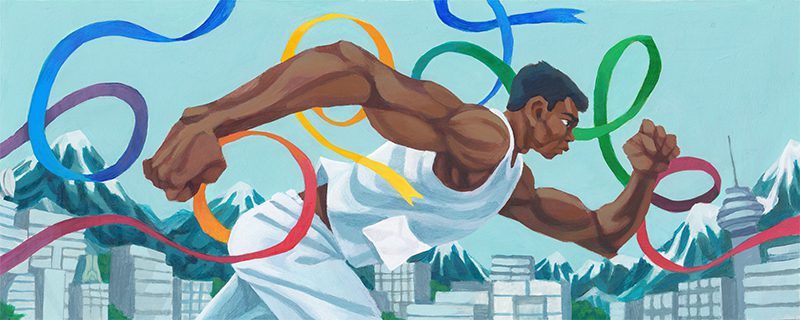On this day 60 years ago, Harry Jerome ran his first world record
It's been 60 years since the Canadian sprinting star set his first of seven world records

July 15 marks the 60th anniversary of a big day in Canadian sports history. It was on this day in 1960 at the Canadian Olympic Trials in Saskatoon that sprinter Harry Jerome ran his first world record, running 10 seconds flat in the 100m. This tied the world record, which had been run by a German athlete just a few weeks earlier, and there would be many world records to follow in Jerome’s career. Today, 60 years after Jerome launched himself onto the world stage, he remains one of the greatest athletes in Canadian history, and he doesn’t get nearly enough credit for what he accomplished in his lifetime.
Harry Jerome, Black Canadian who set 100m record in Sask. in 1960, 'should be celebrated far more than he is'https://t.co/x5zAWtT5aR
— Donovan Bailey (@donovanbailey) June 11, 2020
Pre-world record life
Jerome was born in Prince Albert, Sask., in 1940, but his family eventually moved to North Vancouver. As reported by the CBC, life was not easy for Jerome and his family, and they dealt with racism living in B.C. When they first arrived in North Vancouver, locals signed a petition to block them from moving into their neighbourhood. They eventually found a home and settled in, but their lives were no easier, and Jerome and his sisters (one of whom, Valerie, also competed in the Olympics) had rocks thrown at them by white children as they walked to school.
RELATED: Harry Jerome gets a Google Doodle
After high school, Jerome attended the University of Oregon, where he ran under legendary coach and co-founder of Nike, Bill Bowerman. By 1960, he was ready to compete on the Olympic stage, and he returned to Saskatchewan for the Canadian Trials, where he equaled the 100m record.

Records and accomplishments
The CBC writes that many reports from July 15, 1960 said Jerome actually ran a sub-10-second 100m. Instead of announcing a new world record, race officials decided to round up to 10 flat because they figured no one would believe that they’d recorded the race accurately if they said Jerome had run 9.9 seconds. Later that summer, Jerome travelled to Rome to compete at the Olympics, along with Valerie, who ran in the women’s 100m. A pulled muscle in the 100m semi-finals kept Jerome from advancing to the finals, but that wasn’t his last shot at Olympic glory.
RELATED: Harry Jerome biopic to be shown in Canadian high schools
Four years later, he ran at the 1964 Games in Tokyo, where he won bronze in the 100m and finished just off the podium in fourth place in the 200m. In 1966, he won 100-yard gold at the Commonwealth Games, and a year later, he matched that performance with another top finish, this time in the 100m at the Pan Am Games. He closed out his Olympic career in 1968 at the Summer Games in Mexico City.
HARRY JEROME: In 1912, John “Army” Howard, would break colour barriers to become the first Black athlete to compete in the Olympic Games…48 years later his grandson Harry Jerome set a world record in the 100m.
Learn more: https://t.co/9ltAF4wcwU #BlackHistoryMonth pic.twitter.com/6llI9L8Zix
— Commonwealth Sport Canada (@CwthSportCAN) February 18, 2020
Over the course of his career following that July night in Saskatoon, Jerome set six more world records. According to the Canadian Olympic Team website, between 1963 and 1966, he set or equaled four 100m and 100-yard world records. In 1962, he was a member of a University of Oregon 4x100m team that tied the world record of 40 seconds, and in 1964 he tied the indoor 60-yard record of six seconds flat.
RELATED: Tom Longboat Day: Ontario celebrates 134 years since the Onondaga runner’s birth
Post-retirement
Jerome worked as a teacher after retiring from track and field, and he also acted as an advocate for athletes and endeavoured to get them better health care, coaching and scholarships. He was also heavily involved in helping underprivileged and Black children get into sports. In 1982, just 14 years after his last race as an Olympian, Jerome passed away from a brain aneurysm at the age of 42.
His legacy lives on today through events like the Harry Jerome Classic, a track meet in B.C., but as one of the best athletes in Canadian history, Jerome deserves a lot more recognition than he gets now.


